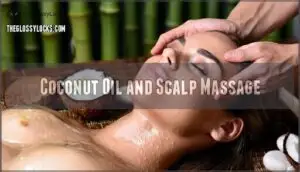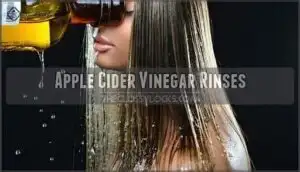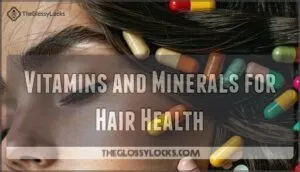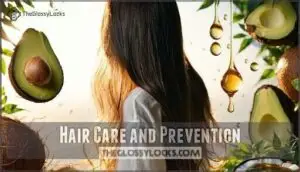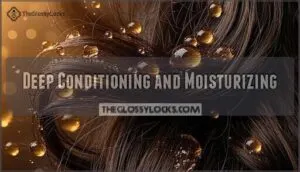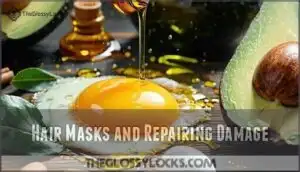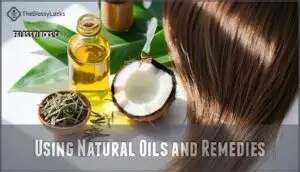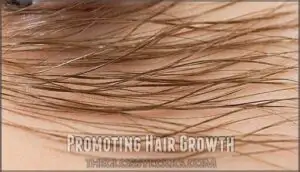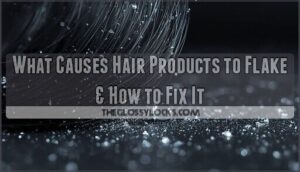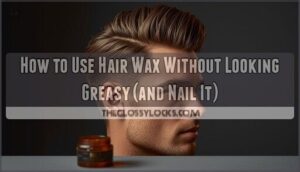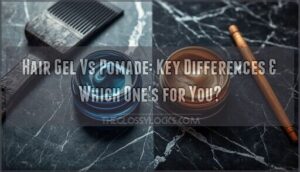This site is supported by our readers. We may earn a commission, at no cost to you, if you purchase through links.
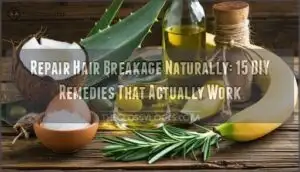 You can repair hair breakage naturally using nourishing oils and DIY treatments that strengthen damaged strands from within.
You can repair hair breakage naturally using nourishing oils and DIY treatments that strengthen damaged strands from within.
Coconut oil penetrates hair shafts to restore moisture, while protein-rich egg masks rebuild weakened cuticles.
Apple cider vinegar rinses smooth rough patches, and aloe vera provides deep hydration.
Essential oils like rosemary boost circulation to your scalp, promoting healthier growth.
Banana masks deliver vitamins that repair split ends, and olive oil creates a protective barrier against future damage.
These gentle remedies work better than harsh chemicals because they address breakage at its source rather than just masking symptoms.
The secret lies in combining the right ingredients with proper application techniques.
Table Of Contents
- Key Takeaways
- Causes of Hair Breakage
- Natural Remedies for Hair
- Hair Care and Prevention
- Repairing Damaged Hair
- Promoting Hair Growth
- Maintaining Healthy Hair
- Frequently Asked Questions (FAQs)
- Are there any natural remedies for hair breakage?
- Can home remedies help with damaged hair?
- How to stop hair breakage?
- How can you repair damaged hair?
- How do you fix a damaged hair strand?
- Are there natural remedies for hair loss?
- Can hair grow back after breakage?
- How to stop breakage of hair naturally?
- How long does natural hair breakage repair take?
- Can stress alone cause severe hair breakage?
- Conclusion
Key Takeaways
- You can strengthen damaged hair with natural ingredients from your kitchen – coconut oil penetrates hair shafts to restore moisture, while egg masks provide protein to rebuild weakened cuticles and repair breakage from within.
- You’ll prevent future breakage by changing your daily habits – use wide-tooth combs on wet hair, sleep on silk pillowcases, avoid heat styling tools, and switch to sulfate-free shampoos that won’t strip your hair’s natural protective oils.
- You need to address the root causes of breakage for lasting results – excessive heat styling, chemical treatments, rough towel drying, and poor nutrition all weaken your strands, so fixing these issues prevents new damage while you repair existing breakage.
- You’ll see noticeable improvements within 4-6 weeks with consistent natural treatments – combine weekly coconut oil scalp massages, protein-rich masks, and apple cider vinegar rinses while maintaining a diet rich in protein, iron, and omega-3s for optimal hair health.
Causes of Hair Breakage
You’re probably breaking your hair more than you realize through everyday habits that seem harmless.
Heat styling, chemical treatments, rough towel drying, and even your cotton pillowcase can weaken your strands and cause them to snap off at the most vulnerable points, due to heat styling being a major contributor.
Dryness and Lack of Hydration
Dryness creates a vicious cycle where your hair becomes brittle and prone to snapping.
When you strip natural oils through overwashing or using harsh shampoos, you’re removing your hair’s protective barrier. Hot water temperature further depletes moisture, leaving strands vulnerable.
Poor scalp health reduces oil production, while low humidity environments pull moisture from your hair shaft.
Proper hydration methods and humectant use restore essential moisture balance.
Excessive Heat Styling
Heat styling tools like blow dryers and flat irons are your hair’s worst enemy.
Your blow dryer is slowly destroying your hair with every blast of heat.
High temperatures strip natural oils, causing heat damage symptoms including dryness, brittleness, and split ends.
Temperature control importance can’t be overstated—limit heat to 300°F or less.
Professional heat styling techniques, heat protectant products, and styling tool alternatives help minimize hair breakage and support damaged hair treatment.
Chemical Treatments and Damage
Chemical treatments wreak havoc on your hair’s protein structure.
Dye damage occurs when harsh chemicals penetrate the cuticle, while bleach breakage strips away natural moisture.
Perm problems and relaxer risks compound when chemical overlap happens – layering treatments without proper recovery time.
These processes disrupt protein bonds, making strands fragile and prone to snapping, requiring targeted hair breakage repair strategies.
Improper Diet and Nutrition
Your body’s nutritional deficiencies can sabotage healthy hair before it even grows.
Bad nutrition breaks your hair before it even has a chance to grow strong.
Protein deficiency weakens hair structure, while poor vitamin intake and mineral absorption create brittle strands prone to snapping.
Without adequate hydration effects and a balanced diet rich in iron, zinc, and biotin, your hair becomes vulnerable to breakage, making hair breakage repair nearly impossible until nutrition improves.
A balanced diet can provide omega-3 for hydration and overall hair health.
Rough Handling and Styling
Unfortunately, your hair suffers when you handle it roughly during styling routines.
Wet brushing weakens strands substantially, making them vulnerable to snapping. Towel drying creates friction that damages the hair cuticle, while tight hairstyles stress follicles continuously.
- Towel drying causes tangling and immediate breakage
- Wet brushing weakens hair when it’s most fragile
- Tight styles create constant tension and inflammation
- Pillow friction strips moisture during sleep
- Product buildup weighs down strands, causing stress
These rough brushing habits and tight hairstyles contribute directly to hair breakage prevention challenges.
Natural Remedies for Hair
You don’t need expensive salon treatments to restore your damaged hair—your kitchen probably contains several powerful natural remedies.
These scientifically-backed ingredients can penetrate the hair shaft, repair protein damage, and strengthen your strands from the inside out, which can help to restore your damaged hair.
Coconut Oil and Scalp Massage
Coconut oil’s lauric acid penetrates deep into your hair shaft, delivering moisture where it’s needed most.
Warm the oil slightly and massage it into your scalp using circular motions for five minutes. This massage technique boosts blood circulation while the oil absorption strengthens weakened strands from within.
| Application Method | Duration | Benefits |
|---|---|---|
| Warm oil massage | 5-10 minutes | Improved scalp stimulation |
| Pre-shampoo treatment | 30 minutes | Enhanced hair strength |
| Overnight mask | 6-8 hours | Deep coconut benefits |
| Weekly maintenance | 2-3 times | Prevents hair breakage |
Banana and Egg Hair Masks
When protein deficiency meets potassium power, your hair gets the ultimate DIY treatment. Banana hair masks combine with egg masks to create powerful home remedies hair solutions that tackle hair breakage at its core through natural hair repair.
Mask benefits that transform damaged strands:
- Banana’s potassium fortress – Strengthens weakened hair shafts from root to tip
- Egg’s protein powerhouse – Delivers essential amino acids for structural repair
- Moisture magic combo – Restores hydration levels naturally without harsh chemicals
- Cuticle-smoothing action – Reduces frizz while preventing future breakage episodes
- Budget-friendly brilliance – Achieves salon-quality results using kitchen ingredients
Mask preparation: Mash one ripe banana with two eggs until smooth. Application tips: Apply to damp hair, focusing on damaged areas. Leave for 30 minutes before rinsing thoroughly.
Mask variations include adding honey or olive oil. Expected results show improved strength and reduced breakage within weeks of consistent use.
Essential Oils and Moisturizing
While traditional moisturizers sit on your hair’s surface, essential oils like jojoba and argan actually penetrate the shaft for deep scalp hydration.
These oil blends reduce breakage by up to 94% when properly mixed with carrier oils, and create DIY recipes using 25 drops per 50ml base oil for maximum moisture retention and natural hair repair.
Essential oils can also improve overall scalp health, which is vital for maintaining strong hair.
Apple Cider Vinegar Rinses
Apple cider vinegar rinses restore your scalp’s natural pH balance while removing product buildup that weighs hair down.
Mix one part ACV with three parts water for your DIY recipe.
The acidic properties smooth hair cuticles, boosting shine and reducing breakage.
Use this natural remedy once weekly to avoid over-drying your strands and maintain the balance.
Vitamins and Minerals for Hair Health
Your body needs specific vitamins and minerals to fight hair breakage from within.
Biotin benefits include strengthening keratin production, while iron deficiency causes oxygen-starved follicles that snap easily.
Zinc importance lies in supporting follicle repair, and vitamin D regulates healthy hair cycles.
Omega-3s nourish strands, making hair vitamins growth supplements worth considering alongside balanced nutrition.
Deficiencies in key minerals can lead to hair loss, so maintaining proper thyroid function is also essential.
Hair Care and Prevention
Prevention remains your most powerful tool against hair breakage, requiring consistent daily habits that protect your strands from damage.
By adopting gentle techniques and making smart product choices, you can strengthen weak hair and prevent future breakage before it starts, which is a key part of prevention.
Gentle Combing and Detangling
Your widetoothed comb becomes your hair’s best friend when detangling wet hair.
Start at the ends and work upward in small sections to prevent hair breakage.
Use detangling sprays on stubborn knots before combing.
Proper sectioning hair and gentle combing techniques reduce hair tangling while protecting fragile strands from unnecessary stress and damage.
Sulfate-Free Shampoos and Conditioners
Switching from gentle detangling techniques, your choice of cleansing products makes a huge difference. Sulfate-free shampoos preserve natural oils that strengthen hair strands, while traditional sulfates strip away protective barriers. Research shows sulfate alternatives reduce breakage by 60% in damaged hair.
Many consumers now shop sulfate-free options for healthier hair.
Benefits for different hair types:
- Curly and coily hair – Retains moisture and reduces frizz substantially
- Color-treated hair – Maintains vibrancy up to 4 weeks longer than sulfate formulas
- Chemically processed hair – Protects weakened structure from further damage
Natural hair care ingredients like aloe vera and hyaluronic acid in these formulas boost scalp health while addressing sensitivity concerns.
Regular Trims and Haircuts
Every six to eight weeks represents the ideal trim frequency for preventing split ends from traveling up your hair shaft, which causes extensive hair breakage.
Regular haircuts maintain your hair shape while supporting length maintenance goals.
Strategic style changes through professional trimming create a split ends remedy that strengthens weakened strands and promotes healthy growth patterns.
For worry-free results, consider using the two-strand twist method to support your hair care goals.
Protective Hairstyles and Accessories
When choosing protective hairstyles, you’re basically giving your hair a vacation from daily manipulation.
Low manipulation styles like loose braids, buns, and twists reduce friction that causes breakage.
Silk scarves and satin bonnets create a smooth barrier while you sleep, preventing tangles, and hair ties without metal clasps won’t snag strands.
These hair breakage prevention methods maintain moisture and minimize stress on vulnerable areas, ultimately helping to prevent breakage.
Healthy Diet and Nutrition for Hair
Your hair needs proper fuel to stay strong and resist breakage.
Focus on protein intake from eggs, fish, and lean meats to build hair structure. Iron sources like spinach and lentils prevent weak strands, while vitamin deficiencies can trigger breakage.
Omega-3s from salmon and walnuts add shine and strength.
Maintain hydration levels—dehydrated bodies can’t deliver hair nourishment effectively, making hair protein boost impossible.
Repairing Damaged Hair
When your hair’s damaged from heat styling, chemicals, or rough handling, it’s time to shift into repair mode.
These natural remedies can restore strength and shine while rebuilding your hair’s protective structure from the inside out.
Protein Treatments and Masks
When damage runs deep, DIY Protein Masks work like construction crews rebuilding your hair’s foundation.
Hydrolyzed Proteins fill microscopic gaps while Keratin Treatments restore strength—studies show 77% less hair breakage after consistent use.
For those seeking ready-made options, consider products with hydrolyzed protein benefits.
- Egg mask combinations deliver complete amino acid profiles for natural hair protein boost
- Gelatin-based treatments provide affordable vegan protein sources without salon costs
- Two-step protein systems target severe damage but require careful timing
- Watch for Protein Overload—stiff, brittle texture means you’ve overdone it
Deep Conditioning and Moisturizing
Moisturizing damaged strands requires strategic hydration methods that penetrate beyond surface level.
You’ll want to focus on humectant benefits by using ingredients like honey and glycerin, which draw moisture from the environment into your hair shaft.
Oil selection matters—coconut and argan oils work best for deep conditioning hair treatments.
Create DIY conditioners using avocado, egg yolks, and natural oils for intensive hair moisture restoration.
Apply leave-ins containing these hair hydration methods to seal in nutrients and prevent future hair breakage solutions, utilizing deep conditioning techniques.
Hair Masks and Repairing Damage
Protein-packed DIY mask recipes transform damaged strands into resilient locks through ingredient synergy.
Egg masks deliver essential proteins, while avocado provides moisture-rich vitamins.
Apply these natural remedies from roots to tips, focusing on breakage-prone areas, for ideal hair repair.
For deep penetration, use overnight masks twice weekly, allowing deep penetration that strengthens weakened cuticles and restores elasticity naturally.
Reducing Heat Styling and Chemical Use
Breaking your heat styling habit isn’t just smart—it’s necessary for hair breakage prevention.
Swap blow dryers for Air-Dry Techniques like plopping or braiding damp hair.
Choose Heatless Styles such as foam rollers or sock curls instead of hot tools.
Replace harsh Chemical Alternatives with Natural Dyes like henna or coffee rinses.
Your strands will thank you.
Using Natural Oils and Remedies
Several natural oils create powerful remedies for hair breakage through their unique oil penetration abilities and scalp health benefits.
Coconut oil deeply moisturizes strands, while castor oil boosts circulation.
DIY masks combining eggs with olive oil deliver strengthening proteins.
Herbal infusions like green tea stimulate growth, and remedy combinations work best when you mix complementary ingredients for maximum impact, utilizing the benefits of coconut oil and olive oil.
Promoting Hair Growth
Once you’ve addressed the immediate breakage, you’ll want to focus on promoting new, healthy growth from your scalp.
Creating the right environment for hair growth involves nourishing your scalp, supporting your body’s natural processes, and using targeted natural remedies that stimulate circulation and provide essential nutrients.
This approach will help stimulate healthy growth and improve the overall health of your hair.
Scalp Massages and Blood Circulation
Regular scalp massage stimulates blood circulation, delivering oxygen and nutrients directly to hair follicles.
This improved circulation strengthens roots and reduces hair breakage naturally.
Use gentle, circular massage techniques with your fingertips for five minutes daily.
Adding oils like coconut or castor enhances oil absorption while providing stress reduction benefits that further support healthy hair growth.
Healthy Diet and Nutrition for Growth
Your hair’s foundation starts in your kitchen. Hair vitamins growth depends on adequate protein intake – aim for lean meats, eggs, and legumes daily.
Vitamin deficiencies, especially B-complex and iron, directly impact hair elasticity improvement. Mineral absorption from zinc and biotin supports hair strengthening tips naturally.
Hydration importance can’t be overstated – drink eight glasses daily. Omega-3 benefits include reduced inflammation and enhanced healthy hair growth for effective hair breakage prevention, which relies on adequate protein intake and mineral absorption.
Reducing Stress and Promoting Relaxation
Why let stress steal your hair’s strength?
Chronic stress triggers cortisol release, which disrupts hair growth cycles and weakens follicles, leading to increased hair breakage.
Practice relaxation techniques like yoga, meditation, or deep breathing to reduce scalp tension and promote healthy circulation.
These lifestyle changes support natural remedies by creating ideal conditions for hair repair and selfcare routines, ultimately leading to stronger and healthier hair through relaxation techniques.
Getting Enough Sleep and Rest
Quality sleep serves as your hair’s secret weapon against breakage.
During restorative sleep, your body triggers cellular repair processes that strengthen hair follicles and reduce stress hormones that contribute to hair damage.
Aim for seven to eight hours nightly to maximize hair growth cycles.
Poor sleep disrupts these natural healing mechanisms, leaving strands vulnerable to breakage and compromising overall hair health through elevated stress levels.
To further enhance hair strength, consider incorporating rosemary oil benefits, known to stimulate hair follicles and support healthy hair.
Using Natural Remedies for Growth
Beyond traditional treatments, nature offers powerful solutions for hair growth through targeted natural remedies.
These botanical allies work by enhancing scalp circulation and delivering essential nutrients directly to follicles.
Four science-backed natural growth boosters include:
- Pumpkin seed oil – Shows significant regrowth increases compared to minoxidil
- Green tea extract – Increases hair density and diameter within 24 weeks
- Rosemary oil – Stimulates cellular turnover for hair strengthening
- Aloe vera – Provides aloe hydration while unblocking follicles for maximum growth
Maintaining Healthy Hair
Once you’ve repaired your hair breakage, maintaining healthy hair becomes your next priority to prevent future damage.
Consistent daily habits and protective measures will keep your strands strong and resilient against environmental stressors and styling damage.
Regular Hair Care and Maintenance
Establishing a consistent hair care routine forms the foundation of hair breakage prevention. Your scalp health depends on regular cleansing with gentle products and proper hydration methods.
Develop a night routine that includes protective styling and silk pillowcases. Master detangling techniques using wide-tooth combs on damp hair.
Smart product selection means choosing sulfate-free formulas that strengthen rather than strip your strands, which is crucial for maintaining healthy hair through proper hydration methods.
Avoiding Harsh Chemicals and Treatments
Chemical treatments wreak havoc on your hair’s natural structure, making strands vulnerable to breakage.
Skip harsh perms, bleaches, and conventional dyes that strip essential proteins.
Instead, embrace sulfate-free alternatives and natural hair dyes like henna.
DIY hair masks with coconut oil offer chemical-free nourishment.
These natural remedies prevent hair damage while maintaining your hair’s integrity and strength.
Using Gentle and Sulfate-Free Products
Sulfate-free shampoos protect your hair’s natural oils while preventing hair breakage.
Traditional shampoos contain harsh sulfates that strip moisture, leading to hair damage.
Gentle ingredients like coconut-derived cleansers maintain proper product pH without causing scalp sensitivity.
Natural cleansers work effectively while supporting hair repair products in your routine.
Protecting Hair From Damage and Breakage
Daily hair protection starts with smart choices that prevent damage before it happens.
Use silk pillowcases for nighttime protection against friction and breakage. Shield your hair from sun exposure with UV-protective products or hats.
Before swimming, wet hair with clean water and apply leave-in conditioner for swim protection. Regular clarifying treatments remove product build-up that weighs down strands.
Environmental factors like wind and pollution require protective styling and gentle handling techniques. To further protect your hair, consider limiting heat styling to prevent future damage.
Promoting Overall Hair Health and Wellness
Your overall well-being directly impacts hair health.
Medical conditions like thyroid disorders can trigger hair breakage, while lifestyle habits such as smoking restrict blood flow to follicles.
Stress management through meditation and quality sleep for 7-8 hours nightly support natural hair restoration.
These fundamental changes strengthen your hair breakage prevention strategy more than any single natural remedy alone, enhancing stress management.
Frequently Asked Questions (FAQs)
Are there any natural remedies for hair breakage?
Like Samson’s strength lay in his hair, yours can bounce back with nature’s remedies.
Try coconut oil scalp massages, egg protein masks, and aloe vera treatments.
You’ll strengthen strands naturally while preventing future breakage with these natural remedies.
Can home remedies help with damaged hair?
Yes, you can repair damaged hair using natural home remedies.
Coconut oil deeply penetrates strands, while egg masks provide strengthening protein.
Aloe vera balances pH, and avocado masks restore moisture effectively.
How to stop hair breakage?
Like mending a frayed rope, you’ll strengthen hair by using coconut oil masks.
Gentle wide-tooth combing, avoiding heat tools, trimming split ends regularly, are all part of the process.
Eating protein-rich foods, and sleeping on silk pillowcases, are also important for hair strengthening.
How can you repair damaged hair?
You can repair damaged hair by deep conditioning with natural oils like coconut or argan, using protein masks from eggs, trimming split ends regularly, and avoiding heat styling tools completely.
How do you fix a damaged hair strand?
You can’t truly "fix" a single damaged strand once it’s broken, but deep conditioning treatments with protein and moisture can strengthen weakened hair to prevent further breakage.
Are there natural remedies for hair loss?
Natural hair loss remedies aren’t magic bullets, but scalp massages, aloe vera, coconut oil, and essential oils may help regrow hair naturally .
You’ll need patience—results take months, not weeks, to show improvement.
Can hair grow back after breakage?
Hair breakage doesn’t mean permanent loss—your strands can definitely bounce back stronger than before.
With proper care, consistent nourishment, and patience, you’ll see healthy regrowth replacing damaged sections within months.
How to stop breakage of hair naturally?
Ironically, damaging your hair less is the key to stopping breakage naturally.
Massage coconut oil into your scalp weekly, use silk pillowcases, avoid heat styling, and gently detangle with wide-tooth combs when wet.
How long does natural hair breakage repair take?
You’ll typically see improvements within 4-6 weeks with consistent natural treatments. However, complete repair can take 2-3 months, depending on your hair’s current damage level and growth rate.
Can stress alone cause severe hair breakage?
Yes, stress alone can cause severe hair breakage.
When you’re stressed, your body produces cortisol, which disrupts your hair’s growth cycle and weakens strands, making them prone to snapping and breaking easily.
Conclusion
Like a gentle river smoothing rough stones, patience and consistency will transform your damaged hair into silky strands.
You’ll repair hair breakage naturally by combining these proven remedies with proper application techniques.
Start with coconut oil treatments twice weekly, follow with protein-rich egg masks, and maintain regular apple cider vinegar rinses.
Remember, natural healing takes time – you’ll see significant improvements within 4-6 weeks of consistent care.
- https://www.nexxus.com/us/en/haircare-101/what-causes-hair-breakage.html
- https://www.healthline.com/health/hair-breakage
- https://www.target.com/c/hair-oils-treatments-care-beauty/damage-repair/-/N-0eg4cZ55cug
- https://www.goodhousekeeping.com/beauty/hair/tips/g661/homemade-hair-treatments/
- https://www.reddit.com/r/longhair/comments/1hgin5p/whats_your_go_to_hair_oil_to_prevent_split_ends/

